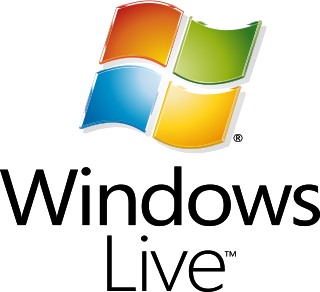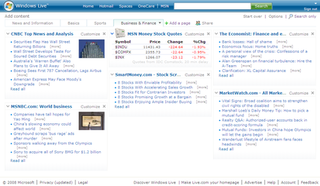Trillian is a proprietary multiprotocol instant messaging application created by Cerulean Studios. It is currently available for Microsoft Windows, Mac OS X, Linux, Android, iOS, BlackBerry OS, and the Web. It can connect to multiple IM services, such as AIM, Bonjour, Facebook Messenger, Google Talk (Hangouts), IRC, XMPP (Jabber), VZ, and Yahoo! Messenger networks; as well as social networking sites, such as Facebook, Foursquare, LinkedIn, and Twitter; and email services, such as POP3 and IMAP.

MSN is an American web portal and related collection of Internet services and apps for Windows and mobile devices, provided by Microsoft and launched on August 24, 1995, alongside the release of Windows 95.
The Xbox network, formerly known and commonly referred to as Xbox LIVE, is an online multiplayer gaming and digital media delivery service created and operated by Microsoft Gaming for the Xbox brand. It was first made available to the original Xbox console on November 15, 2002. An updated version of the service became available for the Xbox 360 console at the system's launch in November 2005, and a further enhanced version was released in 2013 with the Xbox One. This same version is also used with Xbox Series X and Series S. This service, in addition to a Microsoft account, is the account for Xbox ecosystem; accounts can store games and other content.

Windows Live is a discontinued brand name for a set of web services and software products developed by Microsoft as part of its software-as-a-service platform. Chief components under the brand name included web services, several computer programs that interact with the services, and specialized web services for mobile devices.

Windows Live Personalized Experience was a customizable portal launched by Microsoft in early November 2005. It was one of the first Windows Live services to launch.
Yahoo! Answers was a community-driven question-and-answer (Q&A) website or knowledge market owned by Yahoo! where users would ask questions and answer those submitted by others, and upvote them to increase their visibility. Questions were organised into categories with multiple sub-categories under each to cover every topic users may ask questions on, such as beauty, business, finance, cars, electronics, entertainment, games, gardening, science, news, politics, parenting, pregnancy, and travel. The number of poorly formed questions and inaccurate answers made the site a target of ridicule.

Bing Maps is a web mapping service provided as a part of Microsoft's Bing suite of search engines and powered by the Bing Maps Platform framework which also support Bing Maps for Enterprise APIs and Azure Maps APIs. Since 2020, the map data is provided by TomTom, OpenStreetMap and others.

Microsoft Bing, commonly referred to as Bing, is a search engine owned and operated by Microsoft. The service traces its roots back to Microsoft's earlier search engines, including MSN Search, Windows Live Search, and Live Search. Bing offers a broad spectrum of search services, encompassing web, video, image, and map search products, all developed using ASP.NET.
Windows Live Toolbar was a browser extension toolbar for Internet Explorer. It superseded MSN Search Toolbar. Windows Live Toolbar provided a simple search interface that starts to list results as the user types in a search query and uses Bing as its search engine. The toolbar also allows users to synchronize their Internet Explorer favorites across multiple computers and provides an interface to Windows Live and MSN services.

Bing Videos is a video search service and part of Microsoft's Bing search engine. The service enables users to search and view videos across various websites. Bing Videos was officially released on September 26, 2007 as Live Search Video, and rebranded as Bing Videos on June 1, 2009.

Windows Live Spaces was Microsoft's blogging platform and social network service. The site was originally released in early 2004 as MSN Spaces to compete with other social networking services, and re-launched in 2006 as a part of a shifting of community services away from the MSN brand. Windows Live Spaces received an estimated 27 million (27,000,000) unique visitors per month as of August 2007. Despite being considered a useful messaging and communication tool, Windows Live Spaces has been criticized as not being as powerful as some of its alternatives. It was shut down in 2011 due to low viewership.

Bing for mobile is a search tool for handheld mobile devices from Microsoft as part of their Bing search engine. It is designed for mobile device displays. Bing Mobile is built into Windows Mobile and Windows Phone as proprietary software, accessed via the Search key on Windows Phone 7 and Windows Phone 8 devices. It is also available on Windows Phone 8.1, and can be downloaded for other platforms, including and Android.
Bing Shopping is a products search and discovery service that helps save time by bringing products from multiple sellers together on a single website. It uses Bing to show product results–including photos and product details. Products can be filtered and prices compared. Purchases are completed on the seller's website.

Outlook.com, formerly Hotmail, is a free personal email service offered by Microsoft. This includes a webmail interface featuring mail, calendaring, contacts, and tasks services. Outlook can also be accessed via email clients using the IMAP or POP protocols.

MSN Messenger, later rebranded as Windows Live Messenger, was a cross-platform instant-messaging client developed by Microsoft. It connected to the now-discontinued Microsoft Messenger service and, in later versions, was compatible with Yahoo! Messenger and Facebook Messenger. The service was discontinued in 2013 and was replaced by Skype.

Stack Overflow is a question-and-answer website for computer programmers. It is the flagship site of the Stack Exchange Network. It was created in 2008 by Jeff Atwood and Joel Spolsky. It features questions and answers on certain computer programming topics. It was created to be a more open alternative to earlier question and answer websites such as Experts-Exchange. Stack Overflow was sold to Prosus, a Netherlands-based consumer internet conglomerate, on 2 June 2021 for $1.8 billion.

A Microsoft account or MSA is a single sign-on personal user account for Microsoft customers to log in to consumer Microsoft services, devices running on one of Microsoft's current operating systems, and Microsoft application software.
Microsoft mobile services are a set of proprietary mobile services created specifically for mobile devices; they are typically offered through mobile applications and mobile browser for Windows Phone platforms, BREW, and Java. Microsoft's mobile services are typically connected with a Microsoft account and often come preinstalled on Microsoft's own mobile operating systems while they are offered via various means for other platforms. Microsoft started to develop for mobile computing platforms with the launch of Windows CE in 1996 and later added Microsoft's Pocket Office suite to their Handheld PC line of PDAs in April 2000. From December 2014 to June 2015, Microsoft made a number of corporate acquisitions, buying several of the top applications listed in Google Play and the App Store including Acompli, Sunrise Calendar, Datazen, Wunderlist, Echo Notification Lockscreen, and MileIQ.
Q&A software is online software that attempts to answer questions asked by users. Q&A software is frequently integrated by large and specialist corporations and tends to be implemented as a community that allows users in similar fields to discuss questions and provide answers to common and specialist questions.













